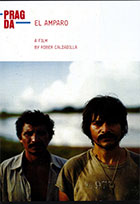
El Amparo 2016
Distributed by Pragda, 302 Bedford Ave., #136, Brooklyn, NY 11249
Directed by Rober Calzadilla
DVD, color, 99 min., In Spanish with English subtitles
College - General Adult
Latin America, History, Political Science, Venezuela
Date Entered: 08/02/2018
Reviewed by Elena Landry, George Mason Libraries, Fairfax, VAAt the beginning of Rober Calzadilla’s El Amparo, the only business shown to be thriving in the sleepy backwater village on the Venezuelan side of the Arauco River bordering Colombia is the cantina. The town’s men appear largely to sit around drinking and waiting for some gainful employment to present itself as the women seem to hold the families together by sheer force of will.
In late October 1988, lured by the promise of cash for a good catch of fish, sixteen men overload a small skiff and set out up the river. Only two of them make it back alive.
The army’s version of the incident was that the men were Colombian guerillas intent on sabotaging an oil refinery, who attacked them with guns and grenades, although the military suffered no injuries. Meanwhile, holed up in the local jail, protected by the righteous anger of the victims’ wives and one courageous sheriff, the two survivors maintain, despite tremendous pressure from all sides, that they were only out fishing.
One of the film’s major themes is doubt. No bloodshed is shown, and no shots are heard, and at first, even the townsfolk want to believe the massacre never happened, that the men described as terrorists on the television were somebody else, and that their husbands and sons will all wander back to town as soon as they’ve slept off a good drunk. At first the sheriff, Mendietta, doesn’t believe Chumba and Pinilla: “No one is going to shoot a group of fishermen. The army doesn’t do that.” When questioned in jail, the wives of the survivors initially doubt their story, and the two men themselves even come to question each other’s innocence.
Mendietta presides with a light hand over a close, if not close-knit community, and the way this community is torn apart by the massacre and its aftermath is heartrending. Pinilla’s wife is last seen in the film leaving town with him still behind bars, and one widowed mother explains her unavoidable decision to accept a payoff: “You can’t eat truth. It doesn’t put food on a plate or milk in a bottle.”
Yet instances of quiet heroism shine through. Mendietta faces down an army colonel at gunpoint when he tries to take the men away without a warrant. When the same colonel (wisely then changed out of uniform) tries to bribe one family into compliance the matriarch scorns the blood money: “My son and grandson are not cattle you can pay for.” And, after all the threats and enticements, Chumba and Pinilla reject the local prosecutor’s demand that they sign an admission of guilt, refusing to betray their murdered neighbors and their families.
The film ends with the town united, if only in a funeral procession in which there are barely enough men left to carry all the caskets of the victims.
El Amparo aired in many festivals, including the San Sebastian International Film Festival, and the International Havana Film Festival. It won Best Screenplay Jury Award at the Sao Paolo Cinema Showcase, and Audience Award at the Biarritz Film Festival.
I recommend this film to anyone interested in Latin American history, military atrocities, and political cover-ups.